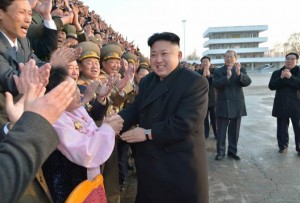 (Reuters) – North and South Korea held their first high-level talks in seven years on their armed border on Wednesday, exploring ways to improve ties while the South and the United States geared up for large-scale military drills that have angered Pyongyang.
(Reuters) – North and South Korea held their first high-level talks in seven years on their armed border on Wednesday, exploring ways to improve ties while the South and the United States geared up for large-scale military drills that have angered Pyongyang.
The meeting was set up with unusual speed and great secrecy at the North’s suggestion last week, the latest example of conflicting signals coming from Pyongyang that included an abrupt cancellation of an invitation for a U.S. envoy to visit.
The North is likely to repeat its demand for the South and the United States to scrap the military drills, due to start later this month, but both sides have plenty of incentives to seek a deal that could break their long stalemate.
“For the North, if it comes back with an accomplishment in terms of improved South-North ties, it will mean a better atmosphere for Kim Jong Un to visit China and a justification to pursue high-level talks with the United States,” said Cheong Seong-chang, an expert at the Sejong Institute outside Seoul.
Kim is believed to be seeking a visit to China, Pyongyang’s greatest ally and main benefactor, to reinforce his legitimacy as leader. In his early 30s, Kim took power when his father died suddenly in 2010,
The South Korean delegation is led by President Park Geun-hye’s deputy national security adviser. North Korea has sent the second-highest ranking official in the ruling Workers’ Party department charged with ties with the South.
The two sides wrapped up a morning session but there was no word on what was discussed in the closed-door meeting at the Panmunjom truce village on the border.
The meeting comes a week before the two sides are scheduled to hold reunions of family members separated since the 1950-53 Korean War at the Mount Kumgang resort just inside the North, which is considered a major humanitarian event by the South.
However, the North has threatened to cancel the reunions, citing a sortie last week by a nuclear-capable U.S. B-52 bomber near the Korean peninsula.
The North has also called for the cancellation of the annual military drills by the South and the United States, calling them a rehearsal for war despite repeated assertions by Seoul and Washington that the drills are routine and defensive.
North Korea has canceled an invitation for U.S. human rights envoy Robert King to visit Pyongyang to discuss the release of imprisoned U.S. missionary Kenneth Bae, which had been expected to come as early as this week.
South Korea halted all trade and most investment with the impoverished North Korea in May 2010 after the sinking of one of its warships, which it blamed on Pyongyang.
A joint factory project in the North’s border city of Kaesong is the last remaining symbol of economic cooperation between the two Koreas.








